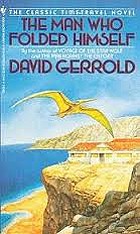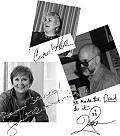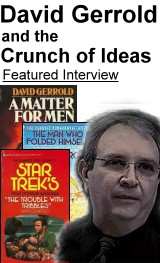Spring 2014
(Oct-Nov)
Me and Science Fiction
by David Gerrold
Yes, I write science fiction. Sometimes I write fantasy. Occasionally I even write horror stories. (I have a doozy I intend to finish today.) But my first love is science fiction because it's about imagining new possibilities.
If there were no such thing as science fiction, I would be a scientist or an engineer or an architect. Or maybe just a hopeless dreamer. But I write science fiction not because it is science fiction, but because it is about who we are and the possibilities of who we can become. That's the excitement for me.
In their current incarnations, neither Star Trek nor Star Wars are science fiction. Both have spaceships and ray guns and aliens and robots and terrific CGI effects. But neither are about expanding the human consciousness. Neither are about exploring and discovering what's possible in the universe. Both are stuck in the trap of being futuristic western shoot-outs, layered with double-talk and bullshit.

Real science fiction challenges, disturbs, upsets, warns, prescribes, and ultimately inspires. Real science fiction changes the way we look at ourselves and the universe we live in. We close the book and the world looks different. It will never be the same again. That's the magic of science fiction.
That's what Robert A. Heinlein and Isaac Asimov and Arthur C. Clarke and Theodore Sturgeon and Ursula K. LeGuin and Joanna Russ and Zenna Henderson and Hal Clement and Larry Niven and too many others to mention here have accomplished in their careers -- they took us places we could not have gone on our own.
That's why I love science fiction, that's why I write it -- and if you don't want to be disturbed, warned, challenged, or inspired to think about the universe differently, then I'm not the guy you should be reading. (No, I can't recommend any nice safe science fiction. I respect other writers too much to denigrate them by calling them "safe." I think writing should be dangerous.)
I intend to be dangerous -- dangerous to assumptions, dangerous to complacency, dangerous to the status quo. There are others who can do it better than I, but I'll do my part anyway.
by David Gerrold
July, 2014
Reprinted by Permission.
See also:
David Gerrold and the Crunch of Ideas (featured interview)
David Gerrold answers The Usual Questions
David Gerrold's web site
This issue in Festivale
Steampunk: A Marvellous Excursion
Author and presenter Michael Pryor writes about the genre of Steampunk, with a history, and explanation and some recommendations.
In brief, what we call Steampunk is speculative fiction set in (or redolent of) the Victorian or Edwardian era, taking the mood of these times and applying a Science Fiction or Fantasy approach. It can be set in our world (with hidden secrets) or in an alternative world, the Victorian era not as it was, but as it should have been.
David Gerrold and the Crunch of Ideas
A featured interview with author David Gerrold.
Defining Horror
Author and editor of The Horror Zine, Jeani Rector gives us an introduction to the horror genre, and who is interesting to read.
The concept of horror has unfortunately been stereotyped for many people by slasher and gore films. I am not saying that slasher and gore are not horror. I am saying that slasher and gore are only one sub-genre of horror. So let's ask: what is horror?
New series in the Series Series
She's just a woman who's had a really bad birthday and wound up dead. Or undead. And according to the propheses she's going to be the next queen of the vampires: reading order and synopses MaryJanice Davidson's Undead (Queen Betsy) series.
Wendy Hornsby's Maggie MacGowen series reading order and synopses
StoryBundle Books for Writers
National Novel Writing Month (NaNoWriMo) is a project to encourage published and unpublished authors to write a novel in a month. (For more information on NaNoWriMo)
To encourage and support writers, StoryBundle have put together a special bundle of books on writing.
The StoryBundle system offers a pack of ebooks (epub and mobi, without DRM) for which the purchaser pays "what they're worth". Pay $15 or more for these books and you get an additional six books.
Titles include Killing the Top Ten Sacred Cows of Publishing by Dean Wesley Smith, The Pursuit of Perfection and How it Harms Writers by Kristine Kathryn Rusch, 500 Ways to Write Harder by Chuck Wendig, Charisma +1: The Guide to Convention Etiquette for Writers, Geeks, and the Socially Awkward by Jessica Brawner, Million Dollar Productivity by Kevin J. Anderson.
To purchase the NaNoWriMo StoryBundle, or get more information, click here.
The Usual Questions Project
More authors have answered The Usual Questions, our quirky, Q and A sessions.
Anyone who is a professional can be part of the project: authors, illustrators, film-makers, performers. The Usual Questions index page has a list of the authors and film-makers and illustrators participating in the project.
People who have answered the questions in the past include Terry Pratchett, Lawrence Block, Janet Evanovich, Charlaine Harris, Tanya Huff.
This issue, the following authors and editors and illustrators have responded:
Harlan Ellison
Elizabeth Ann Scarborough
Liesel Schwarz
Mark Onspaugh
Phil Nork
Jonathan Winn
L. J. Sellers
Cecilia Tan
Diana J. Febry
Tony Whelpton
Jaine Fenn
Kenneth W. Cain
Walter Jon Williams
Edward McKeown
Matt Howarth
Mike Jansen
Dan Abnett
T. Fox Dunham
A. G. Riddle
Rosanne Dingli
Colleen Collins
E. C. Ambrose
Josh Malerman
Thomas F. Monteleone
Kym Roberts
Frances Hardinge
Mason Cole
Khloe Adams

For posts about Melbourne events, places, news, reviews, giveaways, see our Facebook Page:






 Published in Melbourne, Victoria, Australia
Published in Melbourne, Victoria, Australia